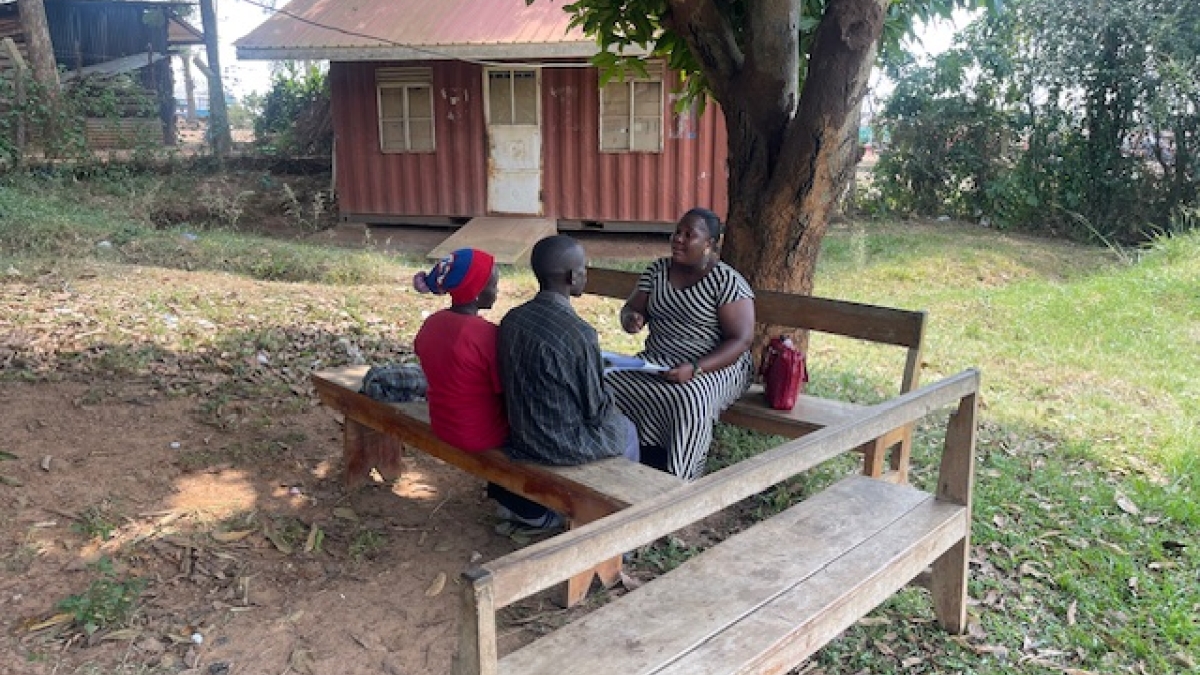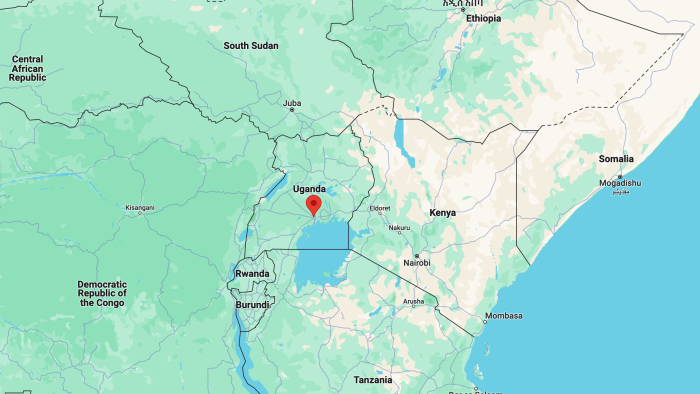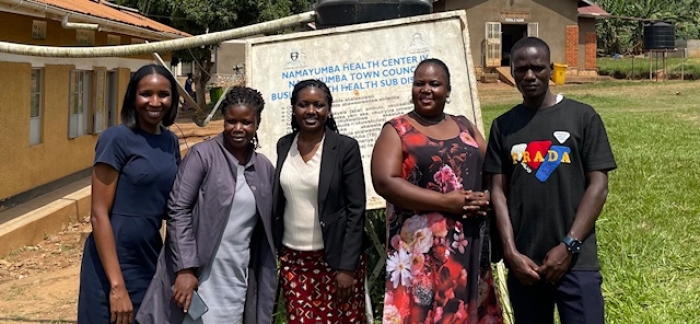Pilot program to address HIV care, intimate partner violence in Uganda

A facilitator with the Kisoboka Mukwano program speaks with two participants in Uganda. Photo by Ijeoma Ogbonnaya
Editor's note: This is the second in a five-part series about ASU faculty conducting summer research abroad. Read about carbon collection in the Namib Desert; the world's tallest palm trees in Columbia; and whiptail lizard research in Mexico.
Uganda has one of the highest rates of HIV in the world.
Nearly 33% of married or cohabiting adolescent girls and young women ages 15 to 24 in the African country have HIV.
The life expectancy after a Stage 3 diagnosis (AIDS) is three years, and according to the Centers for Disease Control and Prevention, a person diagnosed with HIV at age 20 who is untreated can only expect to live to age 32.
Although early and regular treatment can extend life expectancy to age 71, many Ugandan women don’t seek out the care they need.
Arizona State University researcher Ijeoma Ogbonnaya, who has been studying intimate partner violence in Uganda since 2018, wanted to find out why.
She discovered a link between women living with HIV and intimate partner violence — physical aggression, sexual coercion, psychological abuse and controlling behaviors by an intimate partner or ex-partner.
Ogbonnaya, an associate professor in ASU’s School of Social Work, received a grantOther PIs on the project include Susan M. Kiene, from San Diego State University, and Janet Nakigudde, from Makerere University in Uganda. from the National Institute on Alcohol Abuse and Alcoholism to develop and pilot test a couples-based intervention to improve HIV care engagement among Ugandan adolescent girls and young women by reducing male partner alcohol use and intimate partner violence.
This summer, Ogbonnaya was in the rural Wakiso district of Uganda to launch the program, called Kisoboka Mukwano, which means “It is possible my love” in the Luganda language.
Question: The connection between untreated HIV and domestic violence doesn’t seem obvious. How are they linked?
Answer: There are many contributing factors. When women feel depressed because they were abused by their partner, they don’t want to take their medication. Controlling partners also contributed to the problem. Sometimes when partners didn’t accept that they are living with HIV, they wouldn’t allow their partner to take their medication.
Also, many women had to rely on their male partners for money to get transportation to their clinic appointments.
Others hadn’t disclosed their HIV status to their partner, so they didn’t feel comfortable asking for money, or if they did ask, their male partner said no because they controlled the finances.
Q: Domestic violence is often acceptable in this culture. Can you explain why?
A: Based on my research, I have found that women living in Uganda, especially those living with HIV, tend to agree with or accept violence against women.
In one of the surveys, we asked if it was OK for a man to beat a woman if she burned a meal and a lot of women said yes. I was very surprised that even in this day and age, that perception still exists.
We need to shift these norms. Because when you're accepting these behaviors, when you agree that it is OK for a man to beat you as a form of punishment or discipline, then you're more likely to be in a relationship where violence occurs. And you're more likely to stay in that relationship even after knowing the violence exists.
What the research has shown is much deeper than saying you have to leave this relationship. It’s shifting perceptions and norms of what has been agreed upon as acceptable for this age group. I think adolescence especially, it's a key time to shift norms because their norms are still developing. This is also an important population to reach because we can have the most impact or change.
Q: Is leaving an option?
A: These women are vulnerable. They don’t have the power or the resources to leave a violent situation. A lot of times girls and women living in Uganda get married very young. And they're in these relationships more for financial stability than anything else.
And culturally speaking, there is shame and stigma associated with divorce and separation, so they're probably less likely to leave an abusive relationship.
Q: There have been other studies done around intimate partner violence in Uganda. What makes yours different?
A: A lot of the women have talked about male partner alcohol use and how that led to the violence in their lives. So it got me thinking that we need an intervention that not only addresses the violence that the women experience, but what may lead to the violence, which was their male partner’s alcohol.
So the intervention needs to involve not only the women but the men as well. So that's the work that I'm doing now in Uganda. It's an intervention for adolescent girls ages 15 to 24 years old who have experienced intimate partner violence with a partner who reports heavy alcohol use. And it is an intervention that both people in the relationship participate in. That’s what makes this pilot different.
Q: What does the program entail?
A: There are five sessions that meet over eight weeks. In the first session, we meet individually with the male and the female partners. We discuss the harm of alcohol use especially as it relates to violence.
When we meet with the women, we talk about the importance of taking their HIV medication, going to their clinic appointments and having a healthy relationship as it relates to them being engaged in their HIV care.
In the second session, we work with the men and women separately again, but this time in groups to continue the same conversations. In the third session, we speak with a couple alone to discuss ways that they can work together to improve HIV care engagement and reduce or abstain from alcohol use.
In the final sessions, the couples connect with “model couples” that have healthy relationships and have been maintaining their HIV care. They might have had partner violence and alcohol use in the past, but they've overcome those challenges and they're in a healthy marriage.
Q: You were in Uganda for the launch of the pilot. How did that go?
A: The couple I observed was happy to receive the program and highly engaged. The female partner was happy to have someone to talk through the issues she and her partner were dealing with. The participant mentioned that her husband does not want her to work and there have been instances of conflict when she got a job. The counselor helped the participants identify how to handle relationship challenges and provided tips on alternative ways to cope with relationship challenges.
Q: How did it feel to see your work put into action this summer?
A: I was very happy to see the culmination of more than one year of preparation play out. This is the largest grant I have ever led and my first federally funded (NIH) grant.
We have been meeting weekly since September 2022 and collecting interviews and focus group data to inform the development of the Kisoboka Mukwano program manual. To see it play out was truly a dream come true.
More Health and medicine

ASU teams up with Maricopa County to address local life expectancy gap
Arizona State University’s College of Health Solutions is partnering with the Maricopa County Board of Supervisors to address a 14-year life expectancy gap between residents of north Scottsdale and…

ASU professor named Rural Health Fellow
If you live in a major city, chances are you don’t spend much time thinking about what happens in smaller towns and rural areas. But Aaron Guest, an assistant professor at Arizona State…

The rise of NoLo: Many young people opting to reduce alcohol consumption
This month, the U.S. surgeon general released a new advisory on the link between alcohol and cancer risk.The advisory includes a series of recommendations to increase awareness of the link, including…




